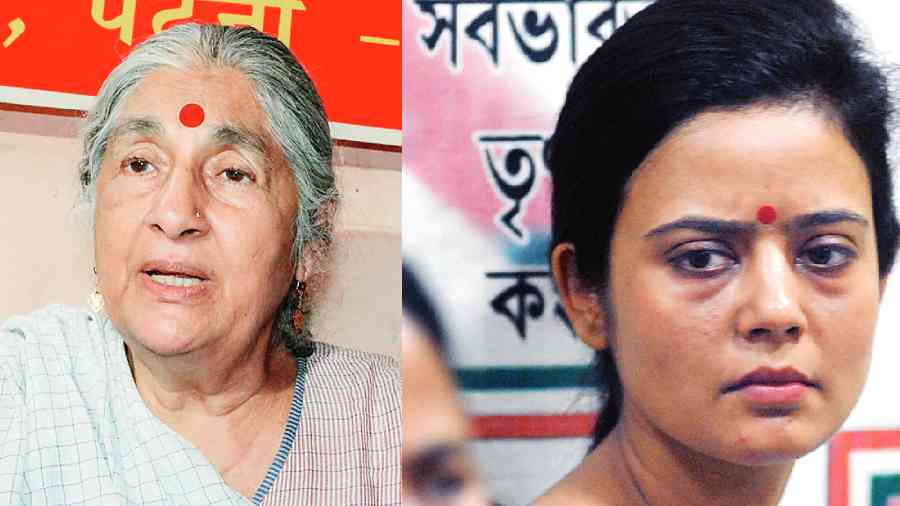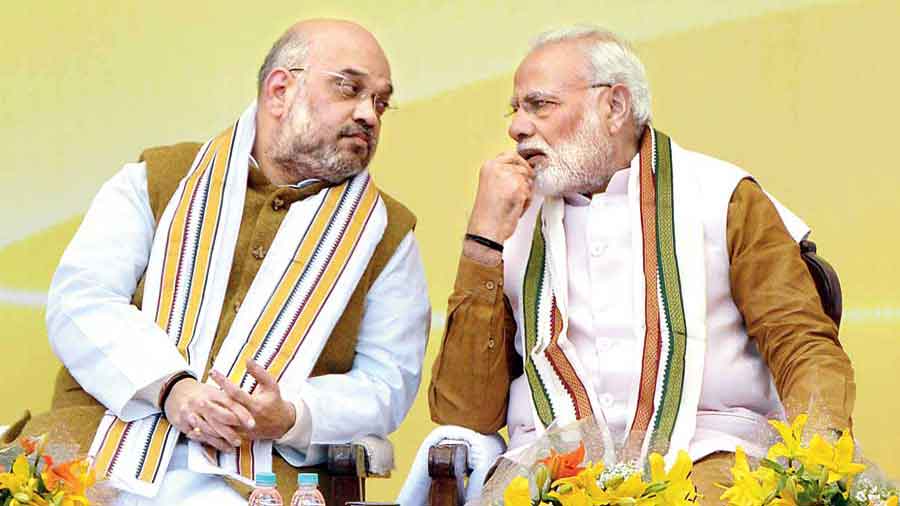The Supreme Court on Tuesday agreed to consider for urgent hearing a petition filed by veteran CPM leader Subhashini Ali and two others challenging the Gujarat government’s decision to release 11 rapists and murderers in the Bilkis Bano case.
Besides Ali, academic Roop Rekha Verma and journalist Revati Laul are movers of the PIL.
A separate petition has been filed by Trinamul Congress MP Mahua Moitra challenging the remission granted to the 11 convicts and seeking that the release order be quashed.
A bench of Chief Justice N.V. Ramana and Justices Hima Kohli and C.T. Ravi Kumar assured senior advocate Kapil Sibal and advocate-on-record Aparna Bhat, appearing for Ali and her co-
petitioners, that it would consider the plea for urgent listing after going through the petition.
“We have to see the paper. Let’s see it, then we will consider,” Justice Ramana, heading the bench, told Sibal.
Justice Ramana asked Sibal whether the remission was granted to the 11 persons — who had gang-raped a
pregnant Bilkis and killed seven of her family members, including her three-year-
old daughter — pursuant
to an order of the Supreme Court.
The senior counsel said the petitioners were challenging the Gujarat government’s August 15 remission, not the order passed by an apex court bench headed by Justice Ajay Rastogi on May 13 that had asked the state government to consider the application for premature release and take a decision in two months.
“We are challenging the order of remission, not the order of the Supreme Court,” Sibal said.
The joint PIL filed through advocate Bhat pointed out that the Gujarat government’s decision was not consistent with the Centre’s special remission policy, dated August 15, 2022, that specifically left out of its ambit those convicted of rape and those handed imprisonment for life.
The PIL noted that since the CBI, a central agency, had probed the Bilkis case, the consent of the Union government was mandatory to grant remission to the 11.
No one in the Union government has clarified whether the Gujarat government had consulted the Centre before freeing the 11 convicts.
The petitioners said the “silence” of the Union home ministry and other constituents of the Centre had compelled them to approach the apex court for “setting aside of such order and directing immediate re-arrest of the convicts so released”.
“The underlying case which led to the conviction of the eleven convicts was investigated by the CBI. Accordingly, grant of remission solely by the competent authority of a state government/ State of Gujarat/ Respondent No. 1, without any consultation with the Central Government/ Respondent No. 3 is impermissible in terms of the mandate of Section 435 of the Code of Criminal Procedure, 1973. At a time when the Respondent No. 2 (Union home ministry) issued a special remission policy dated 15th August 2022, whereby remission on the occasion of 75 years of independence was granted to a class of convicts, persons convicted of rape and those sentenced to imprisonment for life were specifically excluded,” the PIL said.
“Accordingly, it would appear that the Respondent No. 2 endorses a policy decision qua non-grant of remission to persons similarly situated as the 11 convicts, and therefore, it would not have granted permission to the State of Gujarat to remit the sentences of the 11 convicts, had it been consulted in the present matter,” the PIL added.
‘Kill them’
The petitioners said Bombay High Court had affirmed the convictions by the sessions court, also in Mumbai, by recording the sequence of events culminating in the offence during the 2002 Gujarat riots. The Supreme Court had also upheld the convictions.
“It would be entirely against public interest and would shock the collective public conscience, as also be entirely against the interests of the victim (whose family has publicly made statements worrying for her safety) to grant remission in such a case,” Ali and the two other petitioners said.
The petition recalled the observations of Bombay High Court, which had said: “When they (the convicts) were near Pannivel, two white vehicles in which there were about 25 people came from Chhaparwad side towards Pannivel. When they saw the group of ...prosecutrix, they stopped their vehicles. They started shouting ‘Musalmano ko maro (kill the Muslims)” and ran towards the group of prosecutrix.
“These persons who came in the two white vehicles, were carrying swords, lathis and sickles in their hands. From the group of persons who attacked them, the prosecutrix identified accused nos. 1 to 12. Accused no. 4 — Shailesh Chimanlal Bhatt — pulled Saleha, the daughter of prosecutrix — from her arms and smashed her on the ground due to which Saleha died.
“Accused no. 1 Jaswantbhai Chaturbhai Nai who was holding a sword, was going to assault the prosecutrix with a sword, however, she held out her hand to ward off the blow, due to which, she received injury on her left hand. Accused nos. 1, 2 and 3 forcibly removed the clothes of the prosecutrix and committed rape on her. First she was raped by accused no. 1 — Jaswantbhai Chaturbhai Nai — then by accused no. 2 — Govindbhai Nai — and thereafter by accused no. 3 Naresh Modhiya.
“The other accused persons i.e. accused nos. 5 to 12 in the meanwhile, tore off the clothes of the other females in the group and committed rape on them and assaulted the male members in their group.
“In the meanwhile, on account of rape, the prosecutrix became unconscious. She was unconscious for many hours. When she regained consciousness, she found her relatives lying dead, including Shamim’s baby….”
The PIL before the Supreme Court pleaded that in such a heinous offence, “no right-thinking authority applying any test under any extant policy would consider it fit to grant remission to persons who are found to have been involved in the commission of such gruesome acts”.
‘Not independent’
The petitioners noted that it appeared that the Gujarat government’s committee that recommended the release of the 11 convicts was made up mostly of those who bore allegiance to “a political party, and also were sitting MLAs”.
“As such, it would appear that the competent authority was not an authority that was entirely independent, and one that could independently apply its mind to the facts at hand,” the PIL said.
SC guidelines
The petition cited Supreme Court guidelines in the Laxman Naskar vs State of West Bengal (2000) case that laid down the following guidelines for premature release of prisoners:
- Whether the offence is an individual act of crime without affecting society at large
- Whether there is any fruitful purpose of confining the convict anymore
- Whether there is any chance of future reoccurrence of committing crime
- Whether the convict has lost his or her potential to commit a crime.
- The socio-economic condition of the convict’s family.
“Evidently, the decision of the Respondent No. 1 (Gujarat government) to release the 11 accused persons in the present case is contrary to such principles,” the petition said.
Mahua’s plea
Trinamul MP Moitra’s petition, besides seeking quashing of the Gujarat government’s order freeing the convicts, has asked for:
- Framing of guidelines for grant of remission so as to channel the exercise of discretion in granting remission and for the prevention of abuse of such discretion, if found necessary upon an examination of the existing statutory framework
- To ensure the equitable application of existing guidelines by the state government in exercise of its powers of remission
- Pass such other or further orders as the Supreme Court may deem fit and proper in the facts and circumstances of the case and in the interest of justice.
Fear in Bilkis village
A resident of Randhikpur village in Gujarat’s Dahod district where Bilkis Bano was gangraped said on Tuesday that many Muslims have left the village since the re¬lease of the convicts.
Shahrukh Sheikh, a resident of Randhikpur, said 70 Muslim families are living in fear while many others have moved to the homes of relatives elsewhere.
“We are scared. Several people have left the village out of fear of violence from the side of the convicts after their release. We have ap¬pealed to the collector to put the convicts behind bars and pro¬vide safety to the villagers,” said Sheikh, who works as a labourer.
In a memorandum handed over to the Dahod district collector on Monday, villagers said they were leaving because they feared for their safety, especially of the women.
“We have deployed cops at fixed points after talking to locals and intensified patrolli¬ng after the villagers expressed concern over their safety,” said deputy superinten¬dent of police R.B. Devdha.











